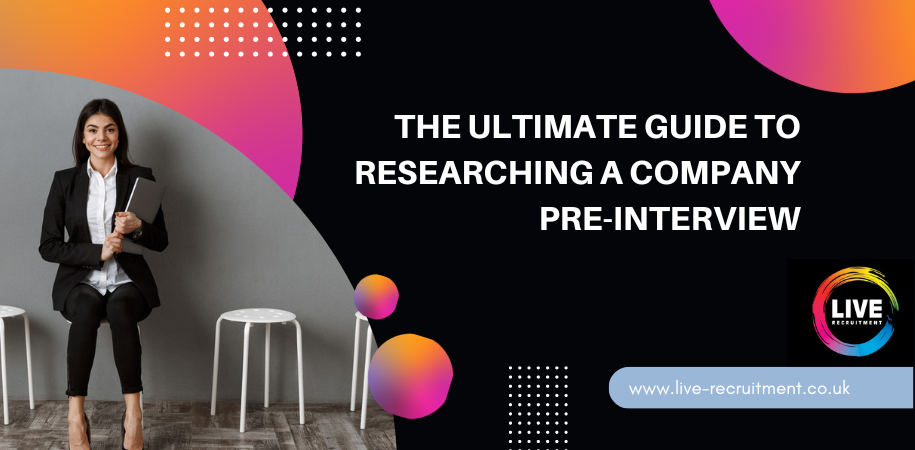The key to performing well in a job interview is about so much more than knowing your own CV and experience. As well as selling yourself, you also need to be able to demonstrate how you fit into the company and how you would be the perfect match for the team.
The best way to achieve this is by researching the company in advance and building an idea in your head about who they are and what they are looking for. Armed with valuable insights, you'll not only impress your interviewers but also make informed decisions about whether the organisation aligns with your career goals.
Here's the ultimate guide to researching a company pre-interview in 2024.
Start with the basics
Begin by gathering fundamental information such as the company's name, industry, location, and the products or services it offers. Familiarise yourself with its mission statement and values to understand its core principles.
The majority of this information will be available on the company website. Remember that their website is where you will find information prepared by the company, and the latest press will be information written about them.
Delve into the company's official website. Look for sections like "About Us," "Our Team," and "Company Culture." These segments often provide a comprehensive overview of the organisation's history, key personnel, and its unique working environment.
You should also aim to stay updated with the company's recent activities, achievements, and any noteworthy news. This will demonstrate your awareness of current events related to the organisation and exhibit genuine interest.
If the company is publicly traded, examine its financial reports. Analysing key financial indicators can give you insights into its stability, growth, and overall financial health. If the company is in financial trouble, do you want to run the risk of being the last in and first out?
Use social media to explore company culture
Explore the company's presence on social media platforms such as LinkedIn, Twitter, and Facebook. Follow its official accounts for the latest updates, and check employee reviews and feedback to gauge the company's reputation. They may also share behind the scenes information that will give you a good impression about their company culture.
Understanding the company culture is paramount. Read employee testimonials, blog posts, or any content that provides insights into the work environment. Evaluate whether the culture aligns with your professional values and preferences.
You can also weigh the opinions of current and former employees on platforms like Glassdoor or Indeed. Pay attention to recurring themes, both positive and negative, to gain a more nuanced understanding of the workplace.
Understand their competitors and the industry landscape
Compare the company with its competitors. Knowing the competitive landscape can help you position yourself as someone who understands the industry dynamics and challenges.
Employers are likely to want you to know who their competitors are in an interview, but be careful about talking about their competition too much. This could make it look like you’ve recently been rejected for a similar role by their competitors.
Explore broader industry trends, challenges, and opportunities. Knowing the external factors affecting the company's operations showcases your strategic thinking and adaptability.
Leverage professional networks like LinkedIn to connect with individuals who currently or previously worked at the company. Engaging in conversations can provide unique perspectives and valuable insights.
Awards and recognitions often reflect a company's commitment to excellence. Look for any accolades the company has received, whether for workplace culture, innovation, or industry leadership. If applicable, examine customer reviews and feedback. Understanding how the company is perceived by its customers can offer additional insights into its market standing.
And finally, research the company's leadership team. Understanding the backgrounds and values of key executives can give you a sense of the company's direction and priorities.
Explore their stance on delicate issues
Examine the company's commitment to diversity and inclusion. Many companies emphasise these values, and showcasing your awareness and support can be an asset during the interview. They might have difficult questions for you about whether diversity in the industry is heading in the right direction.
Other factors to think about include their environmental position. Companies increasingly prioritise environmental and social responsibility. Investigate the company's sustainability initiatives, community involvement, and ethical practices. If they have poor practices in these delicate areas, it might make you question if you even want to work for the company.
Check for any legal issues or ethical concerns associated with the company. This information is vital for making an informed decision about whether the organisation aligns with your values. Have they been caught up in any scandals, and are any current scandals playing out that might impact the future of the business.
Delve into their use of technology
In the rapidly evolving technological landscape, it's crucial to know how a company adopts and integrates new technologies. Familiarise yourself with any recent technological advancements or digital transformations. Who are their delivery partners? Are they leading the way in advancements or are they only following the herd?
In a world where remote work is increasingly common, understand how the company supports and manages remote teams. This is especially crucial if the position involves a hybrid or fully remote work setup.
Turn the tables on them
Based on your research, formulate thoughtful questions to ask during the interview. Evaluate the company's commitment to employee development. Check if there are training programs, mentorship opportunities, or clear paths for career advancement.
This not only demonstrates your preparedness but also shows genuine interest in the company. Remember that an interview is a two-way conversation, so you should always be given the opportunity to ask questions about the company and their culture.
Conclusion
In the competitive landscape of job hunting, knowledge is power. Thoroughly researching a company before an interview not only equips you with the information needed to answer questions effectively but also enables you to evaluate whether the company is the right fit for you. Stay informed, stay curious, and let your research be the cornerstone of your interview success in 2024.


